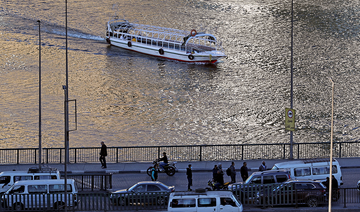CAIRO: Sudan has appointed three representatives of armed rebel groups to top posts in the country’s interim government as part of a peace deal signed last year, the state news agency reported Thursday.
Sudan is transitioning to democratic rule after a mass uprising forced the military to remove longtime dictator Omar Al-Bashir in 2019 and trying to quell years of conflict in its rebellious regions.
The country’s governing body, the Sovereign Council, said in a statement released by Sudan’s state news agency that it had appointed Alhadi Idris Yehia, a leader of the Sudan Liberation Movement, Malik Agar, head of the Sudan People’s Liberation Movement-North faction in the Blue Nile state, and Al-Taher Abu Bakr Hagar, president of Sudan Liberation Forces, as new members.
All fall under the umbrella of the larger Sudan Revolutionary Front, an alliance of armed groups centered in the western Darfur, South Kordofan and Blue Nile regions with whom the government signed a peace deal last year.
The three rebel leaders will be joining the other 11 members of the ruling Sovereign Council, formed in 2019 following a power-sharing agreement between military commanders and civilian protesters, who spearheaded the five-month-long uprising that led to Al-Bashir’s ouster.
Reaching a negotiated settlement with rebels in Sudan’s far-flung provinces has been a crucial goal for the transitional government. The deal was hailed as step toward reviving Sudan’s battered economy and rejoining the international community after years of isolation.
But the government failed to reach similar peace pacts with two other key armed factions ,including Sudan’s largest single rebel group, the Sudan Liberation Movement-North led by Abdel-Aziz Al-Hilu, and the Sudan Liberation Movement- Army, which is led by Abdel-Wahid Nour.
The peace deal, signed in October in Juba after months of negotiations, granted self-rule for the southern provinces of Blue Nile, South Kordofan and West Kordofan and stipulated that that rebel forces should be integrated into Sudan’s armed forces. Under the same deal, rebels were also promised cabinet positions and 75 legislative seats in a yet-to-be-formed transitional parliament.
A cabinet reshuffle is expected to be announced next week, the state’s official news agency SUNA reported late Wednesday.
Sudan appoints key rebel leaders to interim government
https://arab.news/zxuxr
Sudan appoints key rebel leaders to interim government

- The three rebel leaders will be joining the other 11 members of the ruling Sovereign Council
Egypt education minister faces trial over ignored court order

- Egyptian courts had ruled the building must be returned to its owners
- In December, a formal warning was sent to Abdellatif but he refused to carry it out
CAIRO: Egypt’s public prosecutors on Wednesday ordered the education minister to stand trial over accusations he failed to follow a court ruling, a lawyer on the case told AFP.
The case dates back to 2013, more than a decade before Mohamed Abdellatif was appointed minister, and involves a school in the Upper Egyptian city of Minya that the education ministry had been renting, said Amr Abdel Salam, a lawyer representing the school’s owners.
He said Egyptian courts had ruled the building must be returned to its owners, but successive governments allegedly kept delaying execution of the order.
In December, a formal warning was sent to Abdellatif but he refused to carry it out, the lawyer said.
“This forced the school owners to take legal action against him,” he added.
If found guilty, the minister could be jailed, removed from office and ordered to pay one million Egyptian pounds ($21,000) in compensation, Abdel Salam said.
The minister’s trial is set to begin on May 13 with a first hearing.
The ministry has not yet commented on the case.














